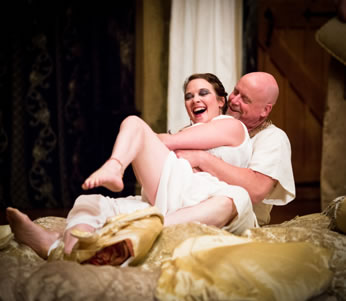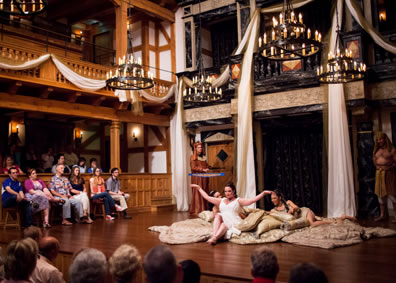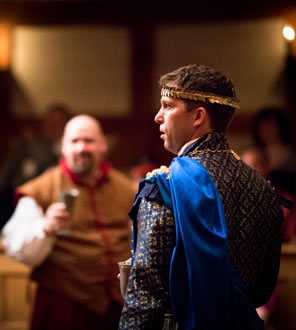Antony and Cleopatra
A Love That Even Death Cannot Part
American Shakespeare Center, Blackfriars Playhouse, Staunton, Virginia
Saturday, September 19, 2015, C–4&5 (front middle stalls)
Directed by Jim Warren

Cleopatra (Sarah Fallon) and Antony (James Keegan) play on their bed of cushions in the opening scene of William Shakespeare's Antony and Cleopatra at the American Shakespeare Center's Blackfriars Playhouse. Below, the Blackfriars turns its bare stage into the Alexandria court, with Cleopatra attended by, from left, Mardian (John Harrell) with the fan in the corner, Iras (Stephanie Holladay Earl), Charmian (Abbi Hawk) and Alexas (Patrick Midgely) in the right corner. Photos by Lindsey Walters, American Shakespeare Center.
Why does Cleopatra take her own life at the end of William Shakespeare's Antony and Cleopatra? It's in the historical record, yes, and Shakespeare points to her unwillingness to be led in triumph in Rome. However, Shakespeare's Cleopatra had already seduced three Roman conquerors, but she doesn't even attempt to do so with Octavius.
The Jim Warren–helmed American Shakespeare Center production at the Blackfriars Playhouse gives us a truth that's not spelled out in the text but is certainly textual. Just like a Romeo and Juliet, Cleopatra doesn't see the worth of living a life without Antony. "I dreamt there was an Emperor Antony," she says after Antony's death. "O, such another sleep, that I might see but such another man!" sleep equaling death. Shakespeare's Antony and Cleopatra is a lot of things: an epic tale of outsized historical figures, a study of political personalities, a drama of conflicting cultures, a portrayal of midlife crises. I've seen it tilted in all these directions over the course of eight stage productions. But in number nine, this ASC text-centric version, I see the play's beating heart as a love story of Cleopatra and her Antony.
How much do they love each other? Hear what they say when not in each other's company. Cleopatra (Sarah Fallon), surrounded by her women and a eunuch, calls Antony "the demi-Atlas of this earth, the arm and burgonet of men," which is poetry for "he is head and shoulders above all other men." She compares not only Antony but, importantly, their love affair favorably to those of her previous powerful lovers, Julius Caesar and Pompey. Fallon further makes Cleopatra's passion for Antony all-encompassing in the way she interlaces sexual delight with romantic yearnings when she recollects her romps with Antony. "That time? O times! I laughed him out of patience, and that night I laughed him into patience, and next morn, ere the ninth hour, I drunk him to his bed," the emphasis on drunk being Fallon's; I don't think we're talking wine here. "Then put my tires and mantles on him, whiles I wore his sword Philippan," whereupon the messenger from Rome arrives, cutting off her description and saving us men in the audience the need to find some ice, stat.
Fallon, in fact, finds the foundation of her character in a passage in the play's final scene when she describes Antony to Octavius's Roman lieutenant, Dolabella, and it's worth repeating in full:
His face was as the heavens; and therein stuck
A sun and moon, which kept their course, and lighted,
The little O, the earth.
His legs bestrid the ocean: his rear'd arm
Crested the world: his voice was propertied
As all the tuned spheres, and that to friends;
But when he meant to quail and shake the orb,
He was as rattling thunder. For his bounty,
There was no winter in't; an autumn 'twas
That grew the more by reaping: his delights
Were dolphin-like; they show'd his back above
The element they lived in: in his livery
Walk'd crowns and crownets; realms and islands were
As plates dropp'd from his pocket.
Goodness, I hope my wife speaks a quarter so well of me after my death. Fallon's delivery of this speech is mesmerizing, gripping the audience in awe and bringing tears to my eyes and those of Allison Glenzer's Dollabella.
Cleopatra's dying words would be "O Antony!" except that the first asp's poison doesn't work fast enough, so she takes a second snake and impatiently implores it to get on with killing her, dying mid-sentence. Antony doesn't get a dying word because Cleopatra is too busy talking, and his last words several lines before his death are to instruct her to trust no one in Octavius's camp other than Proculeius (who ends up betraying Cleopatra, the last of many misjudgments Antony makes in this play).
Antony (James Keegan) is not a man to speak his heart, so his passages of self-aware passions are harder to find. "I must from this enchanting queen break off," Antony says, alone on stage upon receiving news that his wife, Fulvia, is dead and civil wars are breaking out in Rome. Later, after his political marriage to Octavius's sister Octavia, Antony, again alone on stage, determines to return to Egypt. "Though I make this marriage for my peace, I'th'east my pleasure lies." This normally is played as a matter of logic, but in this Warren-helmed production, Stephanie Holladay Earl portrays Octavia as anything but a cold Roman wife. When Antony gives her a respectful goodnight kiss upon the formalization of their union, she returns a sumptuous faceplant, much to Antony's surprise and her brother's shock.
Even without a sexy Octavia, if Antony's feelings for Cleopatra were merely lust-based, a man of Antony's type wouldn't go to so much distance and destruction to sate it. It has to be something so much more. "Egypt, thou knew'st too well my heart was to thy rudder tied by th'strings and thou shouldst tow me after." He says this to Cleopatra after their disastrous defeat in a sea battle when her flagship turned tail and Antony's fleet broke off the fight—so, no, he's not in a romantic mood and speaking love coos here. This is a fretful truth he expresses, the depths to which he only now is coming to understand.
 To know Antony's heart is to observe him, and no one has greater insight into the man than Enobarbus (Rick Blunt)—save for the Soothsayer, perhaps (who also tells Antony to get back to Egypt). Enobarbus's famous speech describing Cleopatra in her barge is celestial in Blunt's reading, delivered with such spine-tingling fervor that we can imagine Antony's own enthrallment in the face of Blunt's Enobarbus. The Romans think of Cleopatra—by them unseen, unheard, not experienced—as a woman to "crop" and yield fruit. But Enobarbus fantasizes on something so much more: an experience of sensual love that is addictive even in fantasy. Antony gets the reality instead of mere fantasy and is hooked, and this we learn unequivocally at the end of the scene when the Romans matter-of-factly contend that Antony must leave Cleopatra now that he's married to Octavia. "Never! He will not," Enobarbus replies with the certainty that man needs oxygen to live. "Age cannot wither her, nor custom stale her infinite variety: other women cloy the appetites they feed, but she makes hungry where most she satisfies." Blunt says these lines so effectively that every person in the audience probably immediately thinks of his or her very own "that one"—I know I did. If Enobarbus, something of a cynic, says this out loud, the more stoic Antony is no doubt living it.
To know Antony's heart is to observe him, and no one has greater insight into the man than Enobarbus (Rick Blunt)—save for the Soothsayer, perhaps (who also tells Antony to get back to Egypt). Enobarbus's famous speech describing Cleopatra in her barge is celestial in Blunt's reading, delivered with such spine-tingling fervor that we can imagine Antony's own enthrallment in the face of Blunt's Enobarbus. The Romans think of Cleopatra—by them unseen, unheard, not experienced—as a woman to "crop" and yield fruit. But Enobarbus fantasizes on something so much more: an experience of sensual love that is addictive even in fantasy. Antony gets the reality instead of mere fantasy and is hooked, and this we learn unequivocally at the end of the scene when the Romans matter-of-factly contend that Antony must leave Cleopatra now that he's married to Octavia. "Never! He will not," Enobarbus replies with the certainty that man needs oxygen to live. "Age cannot wither her, nor custom stale her infinite variety: other women cloy the appetites they feed, but she makes hungry where most she satisfies." Blunt says these lines so effectively that every person in the audience probably immediately thinks of his or her very own "that one"—I know I did. If Enobarbus, something of a cynic, says this out loud, the more stoic Antony is no doubt living it.
Director Warren barely keeps just north of an R-rating in his staging of our first encounter with Antony and Cleopatra in the opening scene. Fallon's Cleopatra, riding crop in hand, enters on the back of a crawling Antony before the two lovers collapse onto a large cushion and pillows spread out on the floor. As the two speak their lines they really go to it, her legs in the air, he kissing her breasts, despite being surrounded by attendants, not to mention audience members sitting on gallants' stools a few feet away, including a couple of teen-age boys whose eyes are growing wider than harvest moons. By contrast, their later scene when she is trying to help him put on his armor is one of domestic contentment. "Sleep a little," she says to him at the start of the scene. "No, my chuck," he replies. If anyone thinks these two are only in lust with each other, here is a depiction of a couple settled into comfortable love, even, literally, in the face of a battle that could end in the ruin of their estates.
Nevertheless, this production is not all for love. As Warren points out in his director's notes, this is Shakespeare's equivalent to an epic, the Titanic of its time. Yet, despite its broad range of settings, its 42 scene changes, its large population, and the supersized egos of the major characters, Antony and Cleopatra remains an intimate play, even in the summit meeting among Rome's triumvirate of leaders, the parley with the rebellion forces, and the war council scenes. Costume Designer Audrey Hamilton-Shelton uses Shakespearean-perspective history to dress the characters: the Romans are outfitted as English Renaissance nobility and gentlemen while the Egyptians appear as classic hieroglyphic figures. Warren manages the play's theatrical and poetical scope with an unrelenting energy in the action that gets its initial charge from the moment René Thornton Jr. as the Roman officer Philo roars on stage speaking the play's first line about "this dotage of our general's," meaning Antony's love for Cleopatra.
This arresting start also signals that even with doubling, tripling, and quadrupling of parts, this veteran ASC cast is going to give us indelible characters. Keegan is a gregarious Antony, a warrior who enjoys the locker room as much as he does the battlefield. He may at first think of Cleopatra as his parenthesis (to borrow a reference from the film Up in the Air) but later accepts that she's become his dependent clause.
By contrast, Gregory Jon Phelps as Octavius Caesar seems not only uncomfortable in company, he seems uncomfortable in his skin. He's not so much confident in his rule as wary of missteps, so he manipulates his world to give him an unobstructed ride. In his stiff portrayal, Phelps offers nuanced clues to the insecurities inside the man. He looks uneasy at Agrippa's (Thornton's) suggestion about Antony marrying Octavia. Some productions present this scene as preplanned staging by Octavius and Agrippa, but Phelps's Caesar is hearing it for the first time and revolts at the notion of having Antony as a brother-in-law. "If Cleopatra heard you, your reproof were well deserved of rashness," Octavius tells Agrippa as if trying to head off the idea. However, Antony urges it on with "I am not married, Caesar: let me hear Agrippa further speak," prompting Agrippa to continue with his proposal and sending Phelps's Octavius into manipulation mode. In the party scene celebrating the truce between the triumvirates and the rebels, Phelps maintains a state of aloofness, his Octavius both uncomfortable but keenly observing. He does engage in a drinking game (it's in the script) but liquor doesn't affect his steel-trap mind.

Octavius Caesar (Gregory Jon Phelps) attends the party on the barge as, opposite, Enobarbus (Rick Blunt) drinks a health in the American Shakespeare Center's production of William Shakespeare's Antony and Cleopatra at the Blackfriars Playhouse. Photo by Lindsey Walters, American Shakespeare Center.
Octavius has so many officers coming and going it's hard to keep up with who's who, but Cleopatra's court is populated by exotically singular characters who, in this production, become four-dimensional individuals. Holladay Earl as Iras is so reserved as to be pathological. Watch closely Cleopatra's physical berating of the messenger (Chris Johnston), a mostly comical scene, and you will see Iras cowering at the back of the stage. She can't handle adversity, which is a subtext to her dying as Cleopatra prepares to take her own life. John Harrell as the eunuch Mardian nearly steals every Egyptian scene he's in merely by standing at the back of the stage dutifully and impassively air conditioning the court with a large fan. When Cleopatra asks if he has affections, he meekly tells of his "fierce affections, and think what Venus did with Mars," which is so uninspiring Cleopatra cuts him off and moves on to fantasizing on the absent Antony. Later, when she asks for music, Harrell's Mardian starts in with Dan Fogelberg's "Longer" but only gets as far as the fishes before she cuts him off again. Abbi Hawk displays powerful acting chops as she elevates Charmian from a secondary character into a focal point, even though Cleopatra's almost always on stage at the same time. Hawk seems to take her pointers for Charmian from Enobarbus, providing the same cynical truth—and with the same casual attitude—to her queen as he does to his general.
It's a strong ensemble, but Fallon rules this production. On this stage she has played passionate queens (Dido, Queen of Carthage), powerful queens (Henry VI's Margaret), intelligent queens (Henry VIII's Katherine), killer queens (Lady Macbeth), and fairy queens (Midsummer Night's Dream's Titania). She killed as Cassius in Julius Caesar (I use the term both literally and figuratively) and she covered every inch of human passion in The Maid's Tragedy. She combines them all, and tops them all, too, with the first Cleopatra I've seen who merits Enobarbus's description of her. Fallon has such expertise with Shakespeare verse-speaking that she gleans and delivers all the shadings of Cleopatra's personality in the lines: the way she flares hot and cold, the way she soars and sulks on the turn of a thought, the way she shifts from abusive to generous on a single circumstance, the way she moves with regal sensuality, earnest giddiness, and careless intensity, the way she intuitively reads her friends, adversaries, and lovers. In private conversation, Fallon pointed out to me how Cleopatra asks the name of the messenger (Harrell) delivering Octavius's overtures, and after he tells her his name is Thidias, she replies not with his name but with "Most kind messenger": oh, do not think you can contain this Cleopatra.
It is Fallon's crowning achievement in a production that has the audience leaning forward from the edge of seats through the final four scenes. When Antony and Cleopatra ends too soon, you've seen greatness. But really, the play goes on yet: for time cannot wither the love Cleopatra has for her Antony nor sate the appetite Antony has for his Egyptian dish.
Eric Minton
October 13, 2015
Comment: e-mail [email protected]
Start a discussion in the Bardroom



 Find additional Shakespeareances
Find additional Shakespeareances